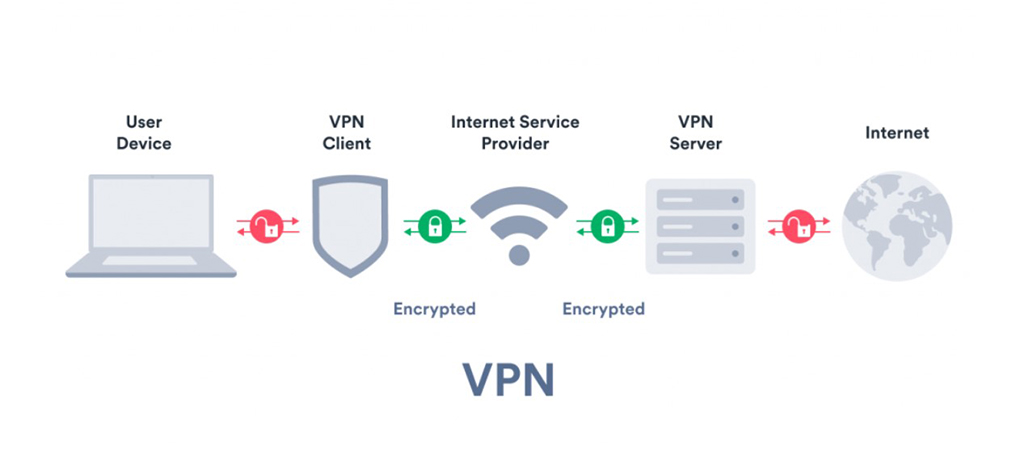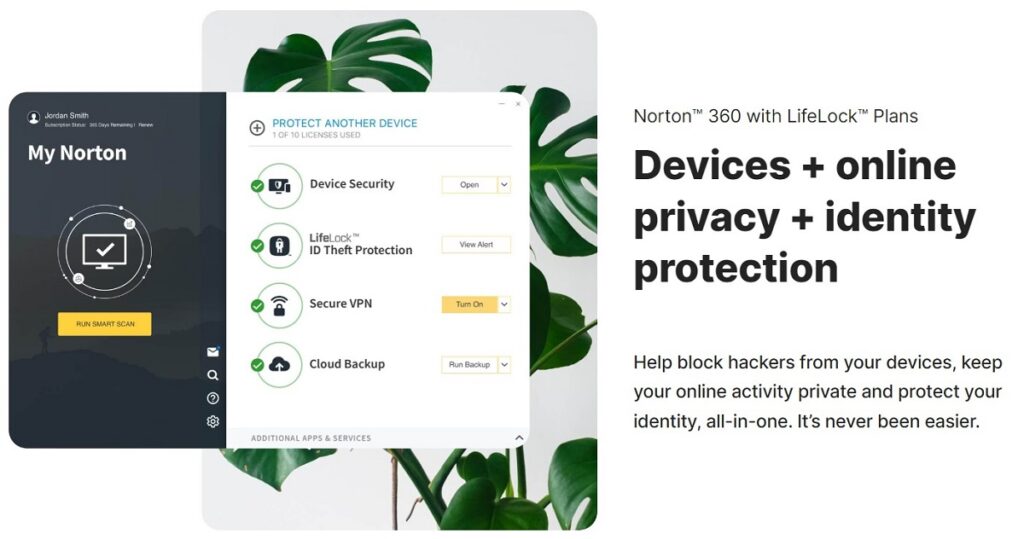Many tools are at our disposal when protecting our digital lives. Today, we're tackling a question I've often heard: “VPN vs Antivirus: Do I need both?” It's a great question, and the answer might surprise you.
Both tools shield you from the threats that lurk in the cyber world. However, they do so in different ways. Even the best VPNs primarily protect your privacy online. On the other hand, antivirus software is your first line of defense against malicious software.
Understanding how these two tools work can be a game-changer for digital safety. In this article, we'll look at VPNs and antivirus software – what they do, how they work, and most importantly, whether you need both to stay safe online. So, let's get started!
What is a VPN?

A VPN is a service that creates a secure, encrypted connection between your device and the internet. When you use a VPN, all the data you send and receive travels through this secure ‘tunnel,' keeping it safe from anyone trying to spy on your online activities.
A VPN Protects Your Digital Privacy
When you connect to the Internet without a VPN, your Internet Service Provider (ISP), and potentially others, can see everything you do online. They can track your activities, see what websites you visit, what you download, and even what you purchase.
When you use a VPN, your ISP can only see that you're connected to a VPN server – not what you're doing or where you're going online.
VPNs also offer the benefit of masking your IP address, which can help protect your identity online. When you connect to a VPN server, it appears to websites and online services that you're accessing them from the server's location, not your actual location.
Limitations of a VPN
It's important to understand that while a VPN provides robust privacy protections, it's not a cure-all for online security. In the debate of VPN vs Antivirus, a VPN won't protect your device from malware or viruses and won't stop you from downloading dangerous files. That's where antivirus software comes in handy.
What is Antivirus Software?

While VPNs focus on keeping your online activities private and secure, antivirus software plays a slightly different role. Antivirus software is a program designed to protect your computer from harmful software or ‘malware.'
The Role of Antivirus Software

Malware comes in various forms – viruses, worms, Trojans, ransomware, and spyware, to name just a few. These malicious programs can infiltrate your system in numerous ways, from email attachments to software downloads to malicious websites.
Once inside, they can wreak havoc in various ways, from stealing your personal information to damaging your files to turning your computer into a botnet. Antivirus software combats these threats by constantly monitoring your system for signs of malware.
It scans files and programs for known threats, analyzes behavior to detect new, unknown threats, and removes any malicious software it finds. Many antivirus programs also include additional features, such as firewalls and email protection, to provide further layers of security.
Limitations of Antivirus Software
Like VPNs, antivirus software is a crucial tool for maintaining your online security, but it has limitations. While antivirus software is excellent at detecting and removing malware, it can't protect your online privacy like a VPN can.
For example, it won't prevent your ISP from tracking your online activities or help hide your IP address or allow you to bypass geographic content restrictions.
VPN vs Antivirus: Why You Need Both
| Feature | VPN | Antivirus |
| Purpose | Digital Privacy | Threat Protection |
| Data Privacy | Yes | No |
| Malware Protection | Not Typical | Yes |
| Ad/Tracker Protection | Yes | Not Typical |
| Bypass Geo-blocks | Yes | No |
| Firewall Feature | Not Typical | Yes |
Now that we've discovered what VPNs and antivirus software do individually, let's look at how they work together. The key thing to understand is that VPN vs Antivirus isn't a contest. In reality, these tools play complementary roles in protecting your online security.
They address different aspects of online security, and using them together provides a more comprehensive defense than using either alone. In essence, VPNs and antivirus software are like two sides of the same coin.
VPNs keep your online activities private and secure, while antivirus software protects your device from malware. Using them together gives you a robust, well-rounded defense against various online threats.
So, do you need both? In a word, yes.
While each tool is powerful, using them in tandem provides the most comprehensive protection for your online activities and devices.
Examples Showing Why You Need VPN and Antivirus
You may think that having one of these tools may sometimes be sufficient. However, that's not really the case. In almost all scenarios, getting something done digitally is a journey, not a simple objective.
Let's examine some of these cases:
Browsing the Web at Home
You might think you're safe from online threats while surfing the web on a private, secure network. Unfortunately, that's not always the case. Malware can still find its way onto your device, even on a secure home network.
They can infect your device through downloads, email attachments, or malicious websites. Antivirus software is crucial to scan and protect your device from such threats in these scenarios.
On the other hand, even at home, your ISP can still track your online activities, or you might want to access geo-restricted content. A VPN can provide the privacy and freedom you need in these cases.
What You Need: VPN and Antivirus
Using Public WiFi
The risks are even more significant when using public WiFi at a café, airport, or other public location. These networks are often unsecured, making it easy for hackers to intercept your data. In these cases, a VPN is essential. It creates a secure, encrypted connection that protects your data from prying eyes.
But even with a VPN, your device could still be vulnerable to malware. For example, if you download a file from a malicious website, your VPN won't stop it. That's where antivirus software comes in.
What You Need: VPN and Antivirus
Downloading Files
If you frequently download files from the internet, you're at a high risk of encountering malware. Antivirus software can scan these files for known threats and remove them before they can infect your device.
However, if you're downloading files from a site you don't want your ISP or anyone else to know about, you'll also need a VPN. A VPN can hide your online activities, ensuring no one can see what you're downloading.
What You Need: VPN and Antivirus
How to Choose The Right VPN and Antivirus
Choosing the right VPN and antivirus software can seem daunting, given the many options available. However, you can narrow your choices by significantly identifying your specific needs.
Do you need a VPN that provides servers in specific countries? Or an antivirus that offers parental controls? These are just some of the questions you might want to consider.
What to Consider When Choosing a VPN
When choosing a VPN, look for one with strong encryption, a no-logs policy, and plenty of server locations. The best VPN providers offer features like a kill switch, split tunneling, and DNS leak protection.
Free VPNs can be enticing but often have limitations such as data caps, slower speeds, and fewer server options. Moreover, some free VPNs have been known to compromise user security. Thus, a paid VPN is usually a safer and more powerful option.
Read our Complete VPN Guide for Beginners
What to Consider When Choosing Antivirus Software
As for antivirus software, opt for a product that offers real-time protection against a wide range of malware, including viruses, ransomware, and spyware. Additional features include phishing protection, a firewall, and automatic updates to protect against the latest threats.
Free antivirus software can provide essential protection, but paid versions usually offer more comprehensive security features.
VPNs With Antivirus or Malware Protection
For those who want to dismiss the entire VPN vs Antivirus theory, a handful of VPN brands have built antivirus features into their VPN services. However, these are often carefully marketed to cover specific aspects of digital security. It's often a more narrow scope than what full-blown antivirus software provides.
Here are Some Examples;
NordVPN Threat Protection
NordVPN is a big name in the cybersecurity world and enhances online safety for its users beyond the traditional role of a VPN. It carries a feature known as Threat Protection, which promises to shield users from malware, web trackers, and intrusive ads.
However, it's important to note that while NordVPN's Threat Protection feature does provide an extra layer of security, it doesn't work exactly like traditional antivirus software. For example, it doesn't monitor processes for suspect behavior, so it's unlikely to catch the very latest threats.
Surfshark One
Unlike NordVPN, Surfshark offers an upgraded version of its primary service with more protection. Surfshark One bumps the monthly price upwards but includes a full-blown antivirus engine and automated notification if your data is found on the dark web.
Unlike most protection features that VPNs offer, Surfshark's antivirus protection is the real deal. It comes with real-time scans, or you can run scans on-demand or schedule. While it certainly isn't Norton, Surfshark does offer great value with this relatively cheap 2-in-1 package.
CyberGhost Security Suite
Like Surfshark, CyberGhost has a souped-up package called the CyberGhost Security Suite. Again costing more than just the VPN service, this package includes antivirus and anti-malware protection.
CyberGhost calls its protection “world-class.” I'm unsure if that's true, but it's far more convenient than running separate VPN and antivirus applications. At the very least, it can't be worse than without antivirus protection.
Antivirus and VPN Form a Necessary Cybersecurity Duo
Cybersecurity is a complex field, and it's essential to understand how VPNs and antivirus software protect your digital life. While there is some overlap in the protections offered by these tools, there is not a clash in purpose when considering VPN vs Antivirus. They fundamentally serve different purposes.
The emerging trend of VPNs offering added features like threat protection is a step towards a more holistic approach to cybersecurity. However, as it stands now, it's questionable if these features are sufficient to replace a full-fledged antivirus program.
For comprehensive protection, you need a VPN to secure your online activities and antivirus to secure your device. Together, they provide a robust shield against various cyber threats.